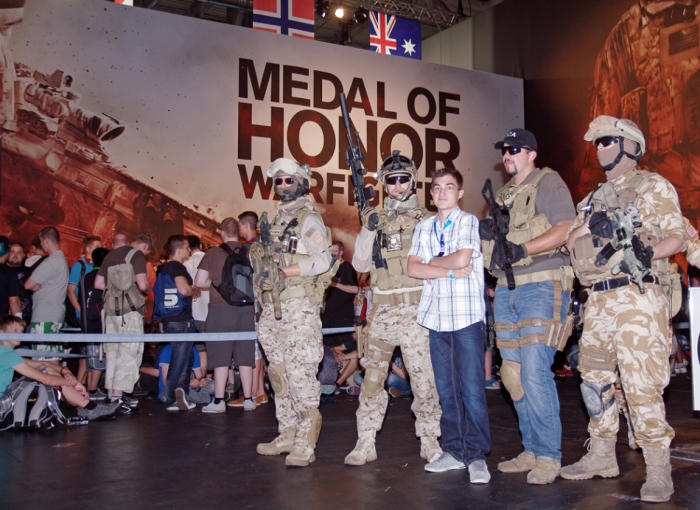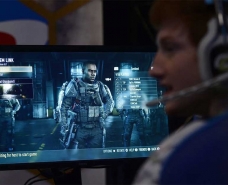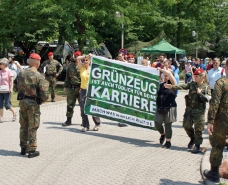On-screen warfare

Michael Schulze von Glaßer
Photo: German Armed Forces recruitment at Gamescom in Cologne, August 2012 (credit - Michael Schulze von Glaßer)
US troops march into Iran in 2014, the Russian army occupies half of Europe in 2016, and the USA is conquered by North Korea in 2027 – today’s video games tell controversial stories which reach an audience of millions. Here is an overview of military video games and the search for alternatives.
According to an inquiry by the Gfk (Society for Consumer Research) Group, the turnover for video game software in 2010 amounted to €1.86 billion in Germany alone.[1] This was 3% more than the previous year. There are now over 22 million people in Germany playing video games, and military-based games are particularly popular: over one million copies of the first-person shooter Battlefield 3 have been sold since its release in October 2011 (more than 15 million copies have been sold worldwide).[2] The video game industry makes billions and has left Hollywood far behind. However, while films are picked apart by critics in numerous feuilletons, video games hardly attract any attention. When they do, it is mostly due to the violence they portray.[3] And yet video games also often make controversial, and political, statements.
Blockbuster military games
In the aforementioned Battlefield 3, the gamer is a US soldier launching an attack on Iran.[4] The battle is set in the year 2014; there had been a coup in Iran and now Western states are threatened by portable atomic bombs. Since the release of Battlefield 3, the Iranian news agency FARS-News has spoken about an 'open war of media' by the Western world against the Islamic republic.[5] The Iranian government banned the game without hesitation, and went a step further, announcing its intention to release several 'opposing games'. Another very popular first-person shooter is the Call Of Duty: Modern Warfare series. The final part of this trilogy was released in November 2011 and provided the creators with a world record turnover of more than one billion US dollars in its first sixteen days on sale.[6] The games narrate the story of ultranationalists who pull strings in Russia to topple the world into a Third World War. In the year 2016 Russian troops march into Berlin and Paris, and Washington is destroyed in a war which sees nuclear weapons and poison gas deployed. The post-Soviet scenario is staged in an action-packed way. A similarly controversial story is that of Homefront, released in 2011.[7] Following the peaceful
reunification of the two Korean states under the regime of Kim Jong-un in 2013, the Greater Korean Republic becomes a new world power and occupies neighbouring states. In 2025 the Koreans attack the USA, which has been weakened by economic crises and the bird flu virus, and immediately either put the population in labour camps, or execute them. In Homefront, the gamer is part of a resistance group that tries to weaken the enemy through guerilla attacks. The game was accompanied by an elaborate advertising campaign and sold over one million copies within five weeks of its release.[8]
The yearly 'gamescom' in Cologne claims to be the biggest video games fair in the world. In 2012, the number of militaristic games on show was enormous, as it has been in the past.[9] A German game producer promoted his new shooter Warface with a replica US Military-helicopter, which you could enter and try the game out on computers inside. Men dressed as US Elite Soldiers walked between the 270.000 visitors (many of them young). And in another hall the real military - the German Armed Forces - were recruting young people, with a real tank by their stall. Hardly anyone was bothered by this; some visitors even came dressed in army uniforms holding replica guns. The influence of military video games on young people seems to be working.

Photo: German Armed Forces recruitment at Gamescom in Cologne, August 2012 (credit - Michael Schulze von Glaßer)
Battlefield 3, the Call Of Duty: Modern Warfare series, and Homefront are just three recent examples of video games with militaristic and bellicose themes, which are to a large extent glorified, through discourses of herosim and nationalism. The gamer always belongs to the 'good' side and fights for a supposedly just cause. The characters are well-educated and likeable. The enemies are always bloodthirsty, mysterious and 'evil', with motives that usually remain unclear; the gamer can kill them without feeling remorse. However, video games which attempt to promote peace and expose war's atrocities, rather than glorify it, have also been produced.
A military 'shooter' that questions
'A game that makes you feel bad', the Spiegel Online wrote about the third-person shooter Spec Ops – The Line, released in June 2012.[10] The playing style of the big-seller does not differ from others in its genre; the gamer is still required to shoot countless opponents with a multitude of weapons. What makes the game so noteable, however, is the narrative; the developers were guided by the book Heart Of Darkness, written in 1899 by Joseph Conrad, as well as director Francis Ford Coppola‘s Vietnam war film Apocalypse Now, which entered cinemas in 1979 and built upon Conrad’s themes. In Spec Ops, the gamer is the leader of a three-part US-reconnaissance troop that, in a fictitious near-future scenario, is despatched to Dubai, which has been destroyed by desert storms.[11] In the city there are merciless skirmishes and shoot-outs involving civilians, CIA agents, and US troops under the command of Colonel Konrad, who is meant to be evacuating people.
The unusual aspect: there is no 'good-bad' formula. During some missions, Colonel Konrad’s troops seem to abduct the civilians, during others they help them. Moreover, Konrad’s soldiers fight against the CIA. The gamer’s troop start off fighting alongside the secret service. However, in doing so they unintentionally eliminate the city's remaining water supplies.
The gamer, with the help of two comrades, then fights his way towards Colonel Konrad's troops whose operations centre is located in a high-rise building in the city. The two comrades die in their pursuit: the streets of the ruined city are lined with countless (and at times decomposing) corpses. It is precisely these images which make Spec Ops such an extraordinary game: in one mission the gamer attacks enemy soldiers with phosphorous grenades, but sees how indiscriminate this weapon is when dozens of burning civilians then crawl towards them. The game's narrative is also very unusual: the gamer eventually learns that Colonel Konrad died some time ago and had suffered from a multiple personality disorder. Instead of successfully carrying out the mission of going to Dubai to observe what is happening and then leaving, the gamer and their two companions are drawn ever- closer to the conflict. The Specs Op gamer justifies their own crimes by what Konrad has done before them. They are faced with multiple moral dilemmas: should they save a group of civilians, or a CIA agent who has crucial intelligence? Ultimately, in the crusade of Spec Ops, the gamer belongs to the bad side – despite the best intentions. Jörg Freidrich, lead 'level designer' in the Spec Ops development studio, explained during an interview that 'We want to prompt the gamer to ask: “Who is actually good here? Me? Who is evil? The other people? Is it so clear-cut?” We want the line to be blurred and to show this to the gamers'.[12] The programmers were able to achieve this. Spec Ops is a challenge to the notion of 'humanitarian military missions'; its chilling and at times unbearable images depict the horror of armed conflict.
Even if Spec Ops shouldn't be regarded as outright anti-war, it does present war in an unprecedented way, and it could be an interesting way of engaging young people with a more critical perspective.
Being a journalist in a virtual war
A real alternative to military shooters is 'newsgames'. One example of this genre is the 2007 game Global Conflicts: Palestine (GCP) produced by the Copenhagen-based company Serious Games Interactive. The gamer is a journalist travelling around the Middle East to conduct research for an article on the conflict between Israel and Palestine. While doing so the gamer is able to decide whether he or she fully supports one side or will make the reports as neutral as possible. Rune Ottosen, a Norwegian professor of Journalism, addressed the game in great detail in his article 'Computer games: peace journalism vs. war propaganda' in the German periodical Wissenschaft & Frieden (Science & Peace). One thing Ottosen examines is the viability of the concept of 'peace journalism', coined by the Norwegian peace and conflict researcher Johann Galtung. Ottosen’s verdict: 'GCP addresses a great number of aspects of the conflict. An important dimension is that GCP attempts to remain impartial and allow the gamer to draw his or her own conclusions. However, the gamer can also choose to be biased and make it onto the front page of the Israeli or Palestinian newspapers with one-sided coverage. Therefore GCP helps people to comprehend how biased journalism influences news content – this is, of course, also highly relevant in the real world of news coverage. It is also an important learning outcome and perhaps the most interesting aspect of GCP.'[13]
Since then there have been further Global Conflict games which have thematised conflicts in Latin America (2008), Africa (2009), and Asia (2009).[14] A similar game currently under development is 'Warco – The News Game'. In Warco, which stands for 'war correspondent', the gamer slips into the role of a female video journalist during an armed revolution in a fictitious African state.[15] No people are shot; only photographs. When, or rather whether, Warco will be released is currently unknown. According to an initial announcement from the developers, the intended release date was 2012 – as of 30 November 2012, no further information had been disclosed.[16]
Newsgames provide a peaceful alternative to well-established military shooters. However, they lack financially-powerful supporters and publishers, and the current journalist games are therefore far behind the best-selling video games on a technical level (graphics, sound, and so on). For many gamers, newsgames simply lack appeal, and the demand remains low – a vicious circle.
Conclusion
Most of today's military video games have a huge impact by spreading messages of acceptable military operations and just wars (of aggression), while also glorifying military practice and technology. At the same time they create stereotypes of enemies, and make one-sided political statements which can have an impact in the real world. In newsgames there is an alternative, whereby the gamer is confronted with the consequences of war and is shown the advantages of peace. However, such games cannot keep up technically with the major military games, and are currently unpopular. At the moment newsgames remain niche and will not become serious competition for military shooters and other war-related games in the foreseeable future, despite the eager reporting by almost all video game magazines after Warco's announcement, and initial images from it appearing to be highly promising.
Spec Ops – The Line finds a middle ground. The technical aspects of the game manage to keep up with popular military shooters and the structure is similar, but its content which sets it apart: war is not glorified but rather shown for what it is, through atrocious images. There is no 'good-bad' dichotomy and the gamer’s main character is ultimately not a hero but rather a broken mass murderer.
Even if, from a pacifist perspective, Spec Ops can only be regarded as a 'reform' of traditional militaristic video games – unlike newsgames it is not 'revolutionary' - more such games would be a good thing, particularly since on a technical level it appeals to the young people who would otherwise play games which glorify war. A newsgame able to keep up with the technical level of popular military video games while offering a well-devised, exciting and interesting narrative whilst also promoting peace, would be indispensable. However, no such game is within sight.
Transparency is needed regarding the military's involvement with video game developers, and public debate on whether this is appropriate should be encouraged. Video games companies producing traditional militaristic video games, and software producers connected to the military - such as those who sell them software for shooting simulators - should be criticised. This could include protesting outside the software companies' headquarters. Critical responses to war-glorifying video games have been lacking within the international peace movement. More energy and resources should be used to develop strategies to campaign against these games.
Notes
[1] Bundesverband Interaktiver Unterhaltungssoftware Games Report 2011, 'Zahlen und Fakten zur deutschen Games-Industrie'. http://www.biu-online.de (accessed 24 December 2011).
[2] The-Khoa Nguyen, 'Battlefield 3 – Verkaufszahlen in Deutschland – plattformübergreifend über eine Million verkaufte Exemplare', 14 August 2012. http://www.pcgames.de (accessed 22 August 2012); 'Battlefield Inside: Battlefield 3 und Battlefield 3 Premium Verkaufszahlen', 1 August 2012. www.battlefield-inside.de (accessed 22 August 2012).
[3] Christian Schiffer, 'Machtspiele im digitalen Sandkasten – wie politisch sind Computerspiele?', in Rudolf Thomas Inderst & Peter Just (eds), Contact – Conflict – Combat – Zur Tradition des Konflikts in digitalen Spielen (Boizenburg, 2011), p. 71.
[4] Michael Schulze von Glaßer, 'Battlefield 3: Das virtuelle Schalchtfeld', 21 February 2012. http://www.imi-online.de (accessed 23 August 2012).
[5] Michael Schulze von Glaßer, 'Krieg der Kriegsspiele', 14 July 2012. http://www.telepolis.de (accessed 23 August 2012).
[6] Giga, 'Call of Duty: Modern Warfare 3 – Bringt Activision 1 Millarde Umsatz', 12 December 2011. http://www.giga.de (accessed 23 August 2012).
[7] Michael Schulze von Glaßer, 'Die Groß-Koreanische Republik vernichtet die USA', 7 March 2011. http://www.telepolis.de (accessed 23 August 2012).
[8] Ali Wenzel, 'Homefront: Schlägt Crysis 2 mit seinen Verkaufszahlen um Längen!', 30 April 2011. http://www.pcgames.de (accessed 23 August 2012).
[9] See my Flickr account for photos: http://www.flickr.com/photos/michaelsvg.
[10] Ole Reißmann, 'Spec Ops: The Line – Wahnsinn in der Wüste', 10 July 2012. http://www.spiegel.de (accessed 13 July 2012).
[11] Michael Schulze von Glaßer, 'Spec Ops – The Line: Das virtuelle Schlachtfeld', 27 July 2012. http://www.imi-online.de (accessed 22 August 2012).
[12] Peter Steinlechner and Michael Wieczorek, 'Spec Ops The Line – Interview und Gameplay', 22 November 2011. http://www.golem.de (accessed 18 Juy 2012).
[13] Rune Ottosen, 'Computerspiele als Instrument der Kriegspropaganda? – Bietet Friedensjournalismus eine Alternative?', in Dossier Nr. 69 'Computerspiele: Friedensjournalismus vs. Kriegspropaganda', in Wissenschaft & Frieden, 1 (2012).
[14] More information on the Serious-Games website: http://www.globalconflicts.eu
[15] Markus Böhm, 'Reporter-Simulation “Warco” – Mit der Kamera durchs Kriegsgebiet', 29 September 2012. http://www.spiegel.de (accessed 30 November 2012).
[16] Ibid.
Translated from the original German by Richard Meakin
Countering Military Recruitment

WRI's new booklet, Countering Military Recruitment: Learning the lessons of counter-recruitment campaigns internationally, is out now. The booklet includes examples of campaigning against youth militarisation across different countries with the contribution of grassroot activists.
You can order a paperback version here.








